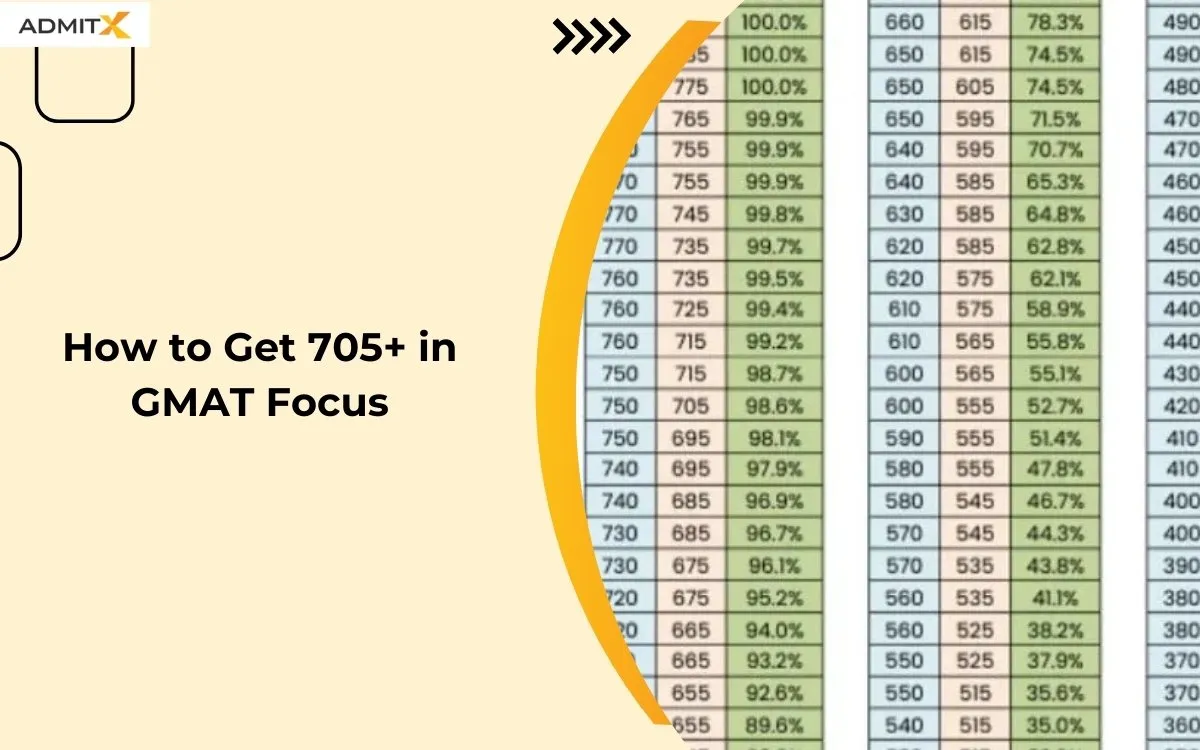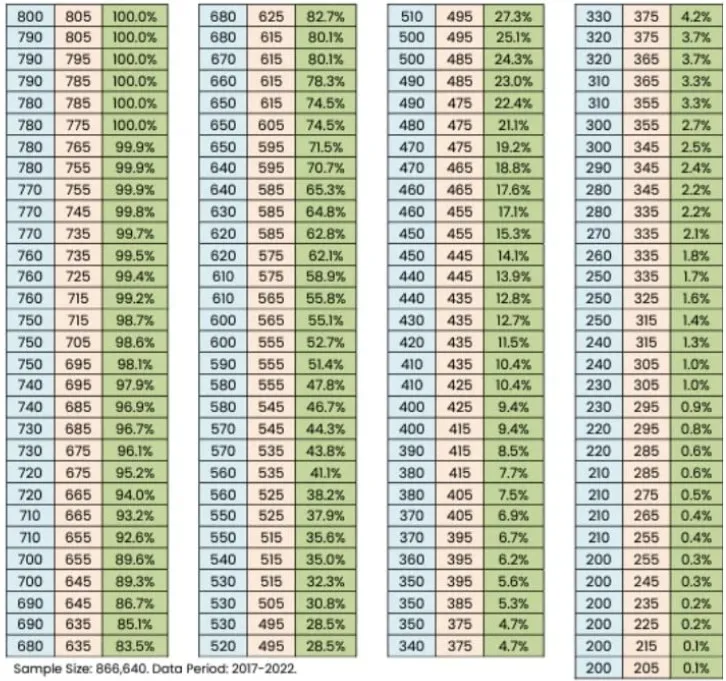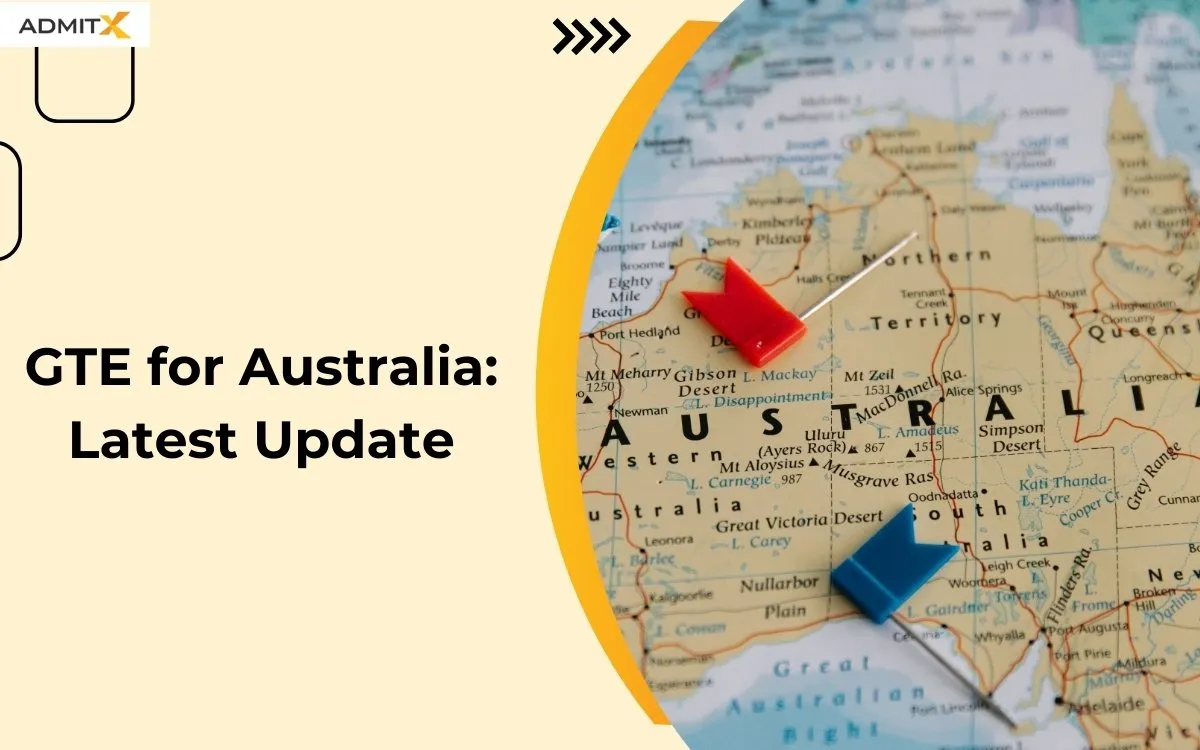
How to Get 705+ in GMAT Focus: Powerful Tips & Strategies
GMAT, or Graduate Management Aptitude Test, is a globally recognised business management admission test. It evaluates your academic readiness to pursue leading business management programs such as MBA. Excelling the GMAT Focus edition means getting a good score in this exam, which can help you secure a spot at the world’s leading B-schools.
It also helps you earn the best scholarships at your desired university. In this blog, we have discussed the strategies and tips to excel in the GMAT exam with ease.
- 3 Advantages of High GMAT Score
- Tips for Excelling the GMAT Focus Exam
- Understand the Exam Format
- Build a Study Plan
- Identify Weaker Areas
- Improve the Core Concepts
- Take Full-Length Mock Tests
- Time Management
- Approach for Guidance
- Top 10 Global B-Schools with Average GMAT Score
- Pattern of GMAT Focus Edition
- GMAT Focus Score Chart
- What GMAT Score is Considered High?
- Key Takeaways by AdmitX
- FAQs
3 Advantages of High GMAT Score
Securing a high GMAT score or percentile gives you the following advantages.
- The highest GMAT score increases your chances of admission to the world’s leading business schools.
- Achieving the highest percentile in the GMAT Focus edition enables business schools and universities to offer you top-tier scholarships and financial aid, helping you cover your expenses.
- Industries and employers often look for graduates with exceptionally good analytical, communication, and problem-solving skills, demonstrated through high GMAT scores.
Tips for Excelling the GMAT Focus Exam
Now, let’s discuss some powerful tips and strategies that can help you score 705+ on the GMAT Focus exam. Here are GMAT preparation tips for Indian applicants aspiring to pursue an MBA at top-tier B-schools around the world.
Understand the Exam Format
- It is necessary for MBA aspirants to understand the format, structure, and syllabus of the exam so that they can prioritise their study efforts effectively by dedicating specific time to each of the sections and topics.
- Each section of the GMAT Focus exam involves a certain number of questions to answer within a particular time frame.
- Master this approach by understanding how much time you would allot to each section, depending on their difficulty level and your knowledge through mock tests.
Build a Study Plan
- The GMAT exam does not assess you academically, but it evaluates your ability to use your knowledge in real-life situations through practical application and understanding.
- Start preparing for the GMAT exam in at least 6-9 months, depending on your current level of readiness, targeted score, and the academic year in which you want to start the course.
- Plan your weekly or monthly study schedule as per your comfort level.
- Break down the sections into sub-sections and take some time to understand their syllabus and pattern of questions.
- Aim for a consistent study plan of around 10-15 hours per week.
- Now, allot a specific time to each sub-section or topic depending on their difficulty level and your comfort.
- Start with basic concepts and gradually move towards more advanced topics.
Identify Weaker Areas
- If you are struggling with certain topics or areas, dedicate some extra time to those by taking the help of an experienced GMAT coach or subject teacher.
- Use GMAT prep books, online resources, and forums to understand key concepts.
- Solve more problems (from basic to advanced level) in those areas and try to build up expertise.
Improve the Core Concepts
| Section | Important Concepts |
|---|---|
| Quantitative Reasoning | Algebra Arithmetic Data Interpretation Reasoning Functions Squares Series Geometry Statistics & Probability |
| Verbal Reasoning | Reading Comprehension Sentence Structure Punctuation Grammar Subject-Verb Agreement |
| Data Insights | Data Interpretation Comparative Analysis Quantitative Inferences Trends and Patterns of Data Sets Statistics |
Take Full-Length Mock Tests
- Allot specific time every week to take full-length mock tests to evaluate your progress and get familiar with real test environments.
- After each test, review the results and discuss with the GMAT coach to identify weak areas to focus on.
- Practice questions are only from the official GMAT guides.
Time Management
- Work on solving questions faster with more accuracy.
- Practice time management techniques.
- Use timers while giving practice tests to simulate the real test environment, which will prepare you mentally and psychologically for the actual scenario.
Approach for Guidance
- Join a GMAT prep course offered by AdmitX to get personalised assistance on preparation and strategies.
- Join online forums such as GMAT Club, Reddit, and Quora to get tips, test insights, and resources with other aspirants.
Top 10 Global B-Schools with Average GMAT Score
The following are the top 10 global B-schools with their average GMAT score scored by MBA aspirants in recent years.
| B-School | QS World University Rankings 2025 (MBA) | Average GMAT Score |
|---|---|---|
| Stanford Graduate School of Business | 1 | 738 |
| Wharton Business School | 2 | 732 |
| Harvard Business School | 3 | 740 |
| MIT Sloan School of Management | 4 | 730 |
| London Business School | 5 | 700 |
| HEC Paris | 690 | |
| University of Cambridge Business School | 6 | 697 |
| Columbia Business School | 7 | 732 |
| IE Business School | 8 | 690 |
| IESE Business School | 9 | 690 |
Pattern of GMAT Focus Edition
Before exploring the tips and strategies for excelling GMAT Focus Edition test, it is required to understand its pattern. The duration of the GMAT Focus exam is 2 hours 15 minutes with 3 sections and 64 questions.
| Sections | Number of Questions | Duration |
|---|---|---|
| Verbal Reasoning | 23 | 45 Minutes |
| Data Insights | 20 | 45 Minutes |
| Quantitative Reasoning | 21 | 45 Minutes |
GMAT Focus Score Chart
The new GMAT Focus Edition test has a score range between 205 (0 percentile) to 805 (100 percentile), as mentioned below.

What GMAT Score is Considered High?
- As per the GMAT Focus score chart, you can use either average or percentile to determine how better you have performed than other test takers.
- You should keep some target scores in mind before starting to prepare for the GMAT Focus exam to align your test preparation with the objective of scoring high.
- To get a higher GMAT score than 50% of the test takers, you would need a total score above 630.
- However, you should aim for around 730+ to be among the top competitive class.
- This can strengthen your B-school application and provide you with several scholarships and financial aid opportunities.
Key Takeaways by AdmitX
Aiming for a high score in the GMAT Focus exam requires strategic planning and consistency in the preparation. It requires understanding the exam format and adhering to some useful tips by dedicatedly working on each of the sections.
Creating a realistic study plan based on the target score and timeline is an effective way to start the preparation for the GMAT exam. It also enables you to stand out in a highly competitive pool of applicants.
FAQs
How much does the GMAT Focus exam cost in India?
The service fees for the GMAT Focus exam in India are around INR 23,200 (test centre) and INR 25,300 (online exam).
How much of a GMAT score is required for the Harvard MBA program?
There is no minimum GMAT score required for the Harvard MBA program, but the average GMAT score that recent MBA applicants have scored is around 740.
How is the GMAT Focus score calculated?
Each section of the GMAT Focus is scored individually on a scale of 60-90, which is based on the number of questions you attempted, difficulty level, and consistency of the performance.
How is the new GMAT Focus Edition different from the classic GMAT?
Unlike the classic GMAT exam, the GMAT Focus exam allows you to choose the order of the sections and review your answers. It also removed the essay writing section.
Is GMAT required for studying business management programs?
Depending on the universities and B-schools, you may be required to submit the GMAT score as a part of your application process. It varies significantly across countries and institutions.







